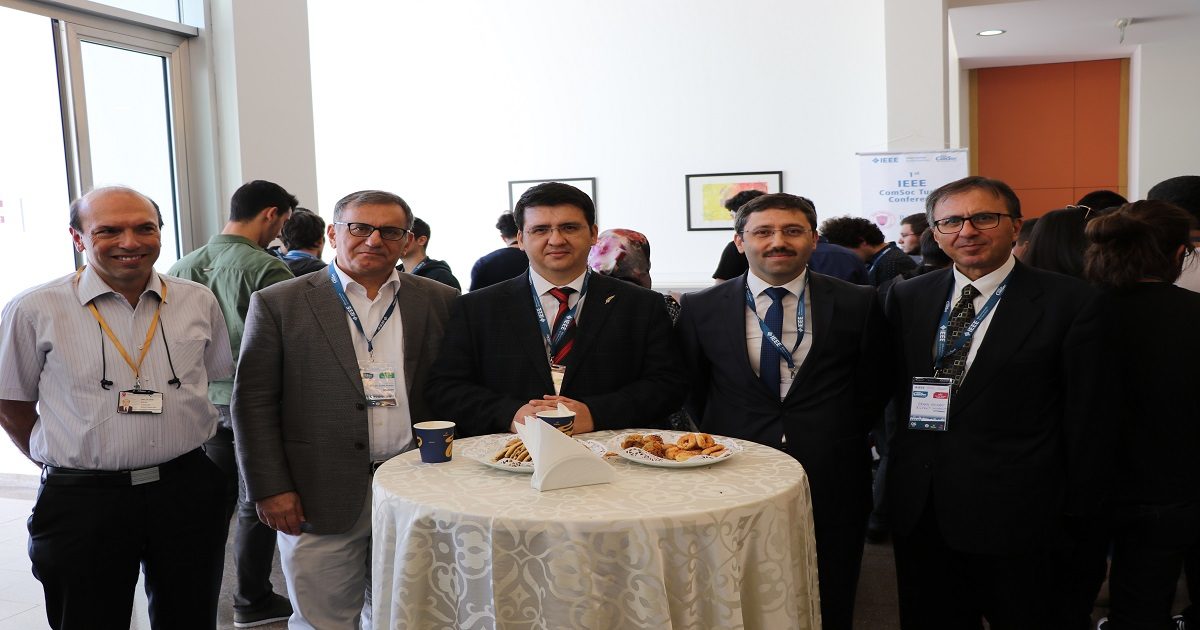IEEE ComSoc Turkey brought together students, academics and professionals
IEEE Communication Society founded in 1952 with the formation of IRE’s (the Institute of Radio Engineers) Professional Group on Communications Systems (PGCS), IEEE Communications Society has evolved into a diverse group of global industry professionals with a common interest in advancing all communications technologies. Members interact across international and technological borders to:
- Produce publications
- Organize conferences
- Foster educational programs
- Promote local activities
- Work on technical committees
Since IEEE ComSoc began operations in January 1972 as an independent Society of The Institute of Electrical and Electronics Engineers (IEEE) with over 8,800 members, IEEE ComSoc has become the premier international forum for the exchange of ideas on communications technologies and information networking.
 1st IEEE ComSoc Turkey Conference
1st IEEE ComSoc Turkey Conference
The ComSoc Chapter of the IEEE Turkey Section organizes a variety of seminars and technical activities in Turkey. One of the most popular activity for this year was the 1st IEEE ComSoc Turkey Conference which was held at Bilkent University, Ankara.
The conference’s aim was to bring together students, academics and professionals working in various fields of communications and networking. Furthermore, to create an environment for intellectual exchange of ideas between people with different backgrounds and perspectives. But also to make this event an important opportunity for students and young professionals to expand their knowledge and increase their awareness of the emerging next generation communication technologies, and the extant academic and professional trajectories.
About the speakers and their topics at conference;
 Prof. Dr. Erdal Arıkan, The Father of Polar Codes : Huawei presented a special award to Professor Erdal Arikan, the inventor of polar codes for 5G, in recognition of his outstanding contribution to the development of communications technology.
Prof. Dr. Erdal Arıkan, The Father of Polar Codes : Huawei presented a special award to Professor Erdal Arikan, the inventor of polar codes for 5G, in recognition of his outstanding contribution to the development of communications technology.
Prof. Dr. Erdal Arıkan gave a speech about Error Correction Coding and Polar Codes, consisting of three parts. In the first part of his speech he gave a general introduction to the Shannon’s channel capacity theorem and the error correction coding problem. The second part was on channel polarization and polar coding. During the final part of his speech he gave an outlook on polar coding from the perspective of emerging applications such as 5G and THz communications.
Lianqing Wu, Huawei Turkey R&D Director : All attendees had the great opportunity to learn about the global trends that Huawei is working on, and the Turkey Research & Development Center. Mr. Lianqing Wu ended with a speech for the students stand on collaborations with universities.
Prof. Robert Schober, a Distinguished Lecturer of the IEEE Communications Society:
He gave first a general overview of the areas of synthetic molecular communication and nano-networking. Components of synthetic molecular communication networks, possible applications, and the evolution of the field will be reviewed. He focused particularly on diffusion based synthetic molecular communication, identify the relevant basic laws of physics, and discuss their implications for communication system design.
Asst. Prof. Tuncer Baykaş, is serving as vice-chair for 802.11 TGbb and 802.19 WG:. In his talk, we reviewed 802.11, 802.15, 802.16, 802.19 and 802.22 task groups’ current projects and activities. Some of the projects we discussed are about V2X communications, visible light communications and full duplex communications. We provided suggestions on how researchers from academia can contribute and benefit from the 802-standardization process.
The conference program included a variety of workshops, such as Science Communication and Reputation Management for Scientists, Precoder design for Downlink Multi-User MIMO Systems and Localization Applications For Smart Cities.



Social Media